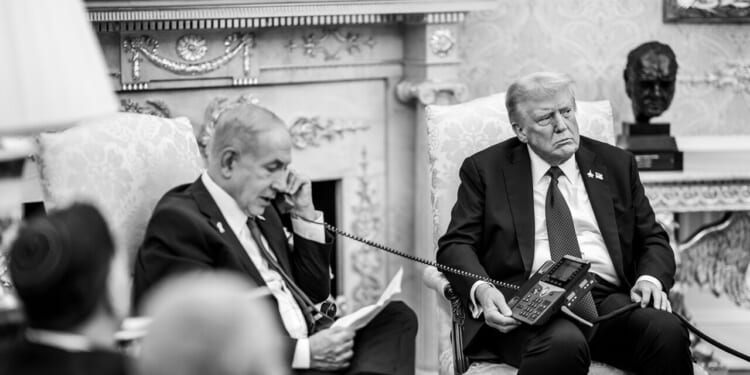Trump’s carefully choreographed photo of Netanyahu’s apology call is intended to reassure the Arab world that the United States can rein in Israel’s destructive foreign policy.
One often hears in media commentary that President Donald Trump is “owned” by the Israelis and that Israeli Prime Minister Benjamin Netanyahu is a “mad dog” in desperate need of a leash. Yet a recent picture has gone viral from Netanyahu’s recent meeting with Trump at the White House. It depicts a sullen Trump seated in the Oval Office, with the office phone in his lap and the headset extended over to a sheepish-looking Netanyahu, who is reading from a piece of paper to someone on the phone.
A Picture Really Is Worth a Thousand Words
It’s rare for a bilateral meeting to so publicly evolve to include other leaders. Yet given the seriousness of what is at hand—and who Netanyahu was clearly compelled to call from the Oval Office—as well as, more importantly, what has been done, the call makes sense.
Netanyahu’s phone call was made to Mohammed bin Abdulrahman bin Jassim al-Thani, Qatar’s joint prime minister and foreign minister. On that call—obviously set up by Trump, who enjoys a close relationship with Qatar’s leaders—Netanyahu apologized to the prime minister for having launched a shocking airstrike on a group of Hamas leaders who were in Doha two weeks ago. That strike stunned the region and created many problems both for the United States and Israel, forcing Trump to try and make amends.
Netanyahu’s apology call amounted to a public humiliation. That the White House would choose to release a photo of the call—in which Trump sits to one side as a chastened Netanyahu reads from a script that the American president gave him—is all the more remarkable.
But Netanyahu had to do something. And it still might not have been enough to repair the massive damage to Israel.
Israel’s Foreign Policy Is Driving Away Its Allies
Of course, Israel is no stranger to international condemnation. Days before his fateful Oval Office meeting with Trump, Netanyahu’s speech at the United Nations General Assembly saw a walkout by delegates from more than 50 countries.
Even before that, though, the geopolitical sands of the Middle East were shifting against Israel in ways that Jerusalem had not experienced since before the Camp David Accords were signed between Egyptian President Anwar Sadat and Israeli Prime Minister Menachem Begin.
The Egyptian government, long a reliable security partner for Israel, has been distancing itself from Israel ever since the Israelis began agitating for Egypt to accept as many refugees from Gaza as possible. Since these tensions began, Egypt has moved large numbers of tanks into the Sinai region bordering Gaza, in an attempt to prevent any flow of refugees created by Israeli strikes in the Gaza Strip.
Jordan has also joined Egypt in its condemnation of Israeli military policy in the Gaza Strip, as well as with Israel’s insistence that they, like Egypt, be pressured into accepting Palestinian Arab refugees from Gaza. The unspoken reason for opposing the influx of fellow Sunni Arabs into their lands is out of the fear that many among those populations would turn out to be Islamists, who would be as much of a security threat to the governments of Egypt and Jordan as they are to Israel. Further, neither Egypt nor Jordan want to be on the hook economically for looking after the refugees.
But then came an added problem—one that was entirely self-created by Israel’s leadership. Under the auspices of negotiating for an end to the war in Gaza, Hamas sent some of its leaders to meet with Israeli representatives in Doha, Qatar. Shortly after arriving at the meeting place in Doha, bombs exploded, killing some Hamas representatives and derailing the talks. It created quite a stir—and undoubtedly sent chills down the spines of basically every Arab leader in the region. If Israel was willing to bomb Qatar, a close US ally, who would it not be willing to bomb? The threat is particularly salient given that most Arab leaders have some affiliation with political Islamism—meaning that Israel could regard them as an enemy at any time.
More importantly, the event caused anger among the already-upset Arab populations of the region, meaning that the governments of those countries were required to take decisive action in some way against Israel, lest their people believe them to be mere puppets of Israel and the United States.
Taking advantage of the moment, Egypt immediately suggested the creation of a rapid reaction force for the Arab lands of the region—a sort of mutual defense pact designed to protect the territorial integrity of the Arab lands, much like how NATO serves as a collective security partnership for the territorial integrity of European states.
A Middle Eastern NATO has long been the dream of American and Israeli leaders—but such an alliance was always envisioned as containing and deterring Iran. Instead, thanks to Israel’s over-the-top actions by striking Doha, the Arab-led NATO is squarely aimed at containing and deterring Israel!
Fortunately for Jerusalem, infighting among the Arab states killed the deal. But Washington was watching, and knew how close to catastrophe it had come.
The Saudi government went one step further. It turned to Pakistan, the only Muslim nation to possess nuclear weapons, and signed an agreement that called for Pakistan to defend Saudi territorial integrity, using those nuclear weapons if necessary. In other words, if Israel attempts a similar strike in Jeddah or Riyadh, it risks nuclear holocaust.
Second Chances are Rare in the Middle East. Netanyahu Needs This One.
Ultimately, it doesn’t matter whether Hamas is a terrorist organization or not, or if Israel is overreaching with its Gaza policy or not. What matters is how the Arabs are reacting—and they are moving away from Israel at a time when Israel needs all the regional partners it can get. Netanyahu knows this. What’s more, Trump forced him to make the call because he understood that Netanyahu’s constant expansion of Israel’s war was destabilizing the region.
The signature foreign policy move of Trump’s chaotic first term in office was the Abraham Accords. Yet ever since Hamas’ October 7 attacks against Israel, the Abraham Accords have been under threat. Indeed, the attacks were likely timed by Hamas—working under the umbrella of Iran—to disrupt the finalization of the Abraham Accords, because the attacks commenced just a week or so after Netanyahu addressed the UN in 2023 and outlined how Israel was more closely aligning its security interests with those of the Arab states of the region.
President Joe Biden was never as committed to the accords as his predecessor was, and there were several missed opportunities for Biden to ensure the accords would not be disrupted. Once returned to power in 2025, Trump found the Middle East a fundamentally changed place because of all that had transpired since October 7.
Until very recently, however, the hope of bringing Israeli and Sunni Arab power more fully together to contain Iran remained. Netanyahu’s strike on Doha may have been the final straw. Trump urging Netanyahu to call and personally apologize to the Qatari leadership may have at least put a heartbeat back into the otherwise dead accords.
Trump is looking for an alternative to what many think will be another round of renewed fighting between Israel and Iran. It remains to be seen what comes next. It is obvious, though, that Trump still wants to get a new regional established in which the United States is not as involved, but instead hands over control to allies, such as the Sunni Arab states and Israel. That phone call between Netanyahu and the Qatari leadership is the first step—possibly—toward rekindling those visionary accords.
What should be absolutely clear is that Donald Trump is not owned by Netanyahu. Likewise, Netanyahu is not so ideologically rigid that he is incapable of realizing the damage he has done to his own cause.
Like a rare desert flower, second chances rarely bloom in the Middle East. Let’s hope the players today recognize this, and attempt to secure a second chance for a new security arrangement.
About the Author: Brandon J. Weichert
Brandon J. Weichert is a senior national security editor at The National Interest. Recently, Weichert became the host of The National Security Hour on America Outloud News and iHeartRadio, where he discusses national security policy every Wednesday at 8pm Eastern. He is also a contributor at Popular Mechanics and has consulted regularly with various government institutions and private organizations on geopolitical issues. Weichert’s writings have appeared in multiple publications, including The Washington Times, National Review, The American Spectator, MSN, The Asia Times, and others. His books include Winning Space: How America Remains a Superpower, Biohacked: China’s Race to Control Life, and The Shadow War: Iran’s Quest for Supremacy. His newest book, A Disaster of Our Own Making: How the West Lost Ukraine is available for purchase wherever books are sold. He can be followed via Twitter @WeTheBrandon.
Image: Flickr / The White House.


















